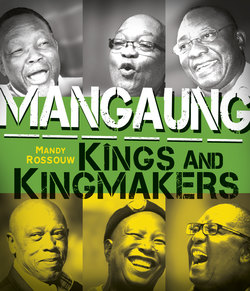Читать книгу Mangaung: Kings and Kingmakers - Mandy Rossouw - Страница 3
На сайте Литреса книга снята с продажи.
ОглавлениеIntroduction
On 16 December 2012 more than 10 000 African National Congress members, government officials, international guests and journalists will descend on Mangaung – as the metropolitan municipality which includes Bloemfontein, South Africa’s former judicial capital, is now officially known. Of these delegates, about 4 000 will participate in a crucial vote that will decide who the president of the ANC will be for the next five years. So what? you might ask. What’s so important about that vote? Why does it matter?
Since becoming a reporter in the Gauteng legislature in 2003, I’ve learnt that politics and policy in South Africa are what happens inside the African National Congress (ANC), not what happens at the ballot box. Although the Democratic Alliance (DA) controls a province, it still has a long way to go before it can credibly contest an election on a national level with the ANC (at least twelve years, analysts speculate). So, those 4 000 delegates, give or take a few, hold not only the future of the ANC in their hands, but also the future of South Africa.
In 2007 many South Africans sighed with relief when Thabo Mbeki, a man who brought so much confusion about HIV and Aids, was removed from the ANC presidency at Polokwane, and later from public office a few months before his term was due to expire. Post Polokwane we have seen that no one is sacred in the ANC – something that began with Mbeki’s ousting. We have also witnessed the erratic policy-making that followed the election of the new leadership – economic policy, for instance, has become stagnant (with one part of government favouring a youth wage subsidy to deal with youth unemployment, and another stating that the policy would not be implemented, despite money being put aside for it). Once again, this reflects the way that the ANC’s elective conference was destabilised at Polokwane.
At Mangaung ANC members will make key decisions about how the party, and therefore the government, will conduct its business in the next five years – just as they did at Polokwane in 2007. The effects of at least some of the decisions taken at the conference may not be immediately clear, while others will be implemented almost on the spot – if the way the ANC dealt with the crime-fighting unit the Scorpions after Polokwane is anything to go by – but because the party infiltrates every part of our society we have no choice but to pay attention. So, Mangaung matters, because unless you’re packing for Perth, the decisions taken there will affect your life, at least for the decade to come.
